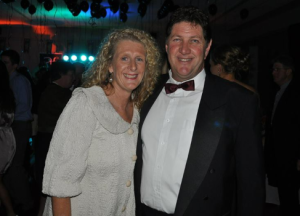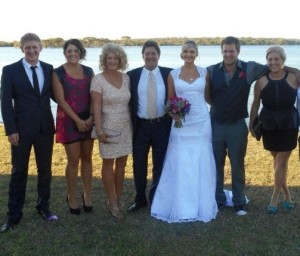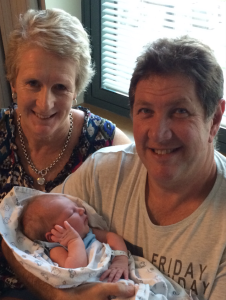Last month, my wife Sally passed away after an eight year battle with cancer. Having had much time to reflect from her passing to now, I have been trying to choose optimism. I thought back to an article I wrote three years ago, to which Sally wrote an article in response (both articles below). Sally coached all of us to take a position of optimism and hope, even at the most difficult of times. We are facing that reality now.

Why I Choose Optimism
By Ray McLean (2012)
Optimism is probably the most important skill I carry through life and is one which I find non-negotiable in leadership.
However, optimism is a tough choice. Optimism is not day dreaming or waiting for luck to strike. Optimism is the choice in tough times to still strive to be happy and hopeful.
I have been married to Sally for almost 30 years. 5 years ago at the age of 47 with 3 teenage children, she was diagnosed with a rare form of sarcoma (cancer). I still remember sitting with the specialist as he told us that this rare, aggressive and erratic form of cancer would mean Sally’s life expectancy could be as little as 1 year.
That was 5 years ago. Sally has since had 10 significant and invasive surgeries. She has also had repeated doses of radiation and chemotherapy. She still has 8 tumours on her lungs but because of the significant number of operations she has had, surgery is no longer a viable option.
Every morning I get out of bed I look at her and then almost scare myself to death with the thought of what life would be like without her. I then choose optimism. Sometimes it takes all of my energy and discipline to make that choice. I also know that for the majority of times she makes the same choice and I know it is infinitely more difficult for her to do that.
So what does choosing optimism mean? Firstly, it means continuing to look for purpose in life. As an example, Sally is still striving to be the best Netball coach she can be with the Lake Wendouree Senior Netball team in the Ballarat Football Netball League. Since she was diagnosed the team has made the Grand Final each year and won 4 of 5. I can assure you the winning is very important but not as significant as the lessons in life the team are picking up from the coach.
Another choice in optimism is concentrating her effort on those she loves. I am indeed fortunate to be one of the recipients of that love along with our children, her extended family and the group of amazing and supportive friends she has.
She also creates opportunities each week to have something to look forward to. This could be as simple as morning tea or movies with a collection of friends from her network.
By the time I have showered and got ready for the day. I just apply the same thinking to my circumstances. I consider my role as a leader in our business and as a facilitator striving to help our clients improve their performance. I know that any choice other than optimism would be soul destroying.
Other actions I am conscious of as an optimist is to sell hope to those around me. I read a great quote a number of years ago and it has become in some ways my mantra – “Seek joy in life – Misery will find you!”
I also am aware that optimists imagine success rather than failure and use affirmation and visualisation to remain in a positive state. You are then able to arrest negative thinking more quickly. I can assure you I have made poor decisions in my life and have had miserable days. However, I now have strategies that enable me to see these events or poor decisions as aberrations that I must move on from. I do accept that it can be tough to plan when you feel you are at the bottom of the well.
I can recall over the last 5 years sitting beside Sally in hospital thinking what small steps can I take from here. As silly as it sounds, if you try to do something for someone else when you are most in need of support that can help. Making sure that when Sally was well enough I picked up her favourite chocolate cake from the deli in East Melbourne was a start.
From purely a work perspective if you don’t choose optimism you can’t perform at your best. As a facilitator responsible for helping teams and individuals improve I have to be prepared to give everything I have got in those sessions. It may mean I chunk things at times and when the session is over I go back to deal with the other concerns I might have. If I am heading to work with a client it doesn’t change how seriously ill Sally is but I know she would expect me to be at my best and then we will regroup when I get home.
I have also found that if you are genuinely an optimist you make the connection that money and happiness are not linked exclusively. I liked a quote from Malcolm Forbes – “If you think money buys happiness you are shopping in the wrong place”.
Sometimes when I have had a bad day or I am feeling sorry for myself, I ask “what if” questions.
- What if I did blame others or circumstances for where I am today?What if I was so stuck on a poor decision that I have made that I couldn’t move on?
- What if I did think that money was the only answer?
- What if I modelled these pessimistic behaviours to my kids/our staff/our friends?
I choose optimism!
Optimism – My Perspective
By Sally McLean (2012)
My husband Ray wrote an article a couple of weeks ago “Why I Choose Optimism.” In my circumstances, I believe that having a positive attitude has served me well. Like Ray, I believe I can acknowledge how I feel and then I can choose how to react to my situation.
As Ray indicated in his article, 5 years ago, following a routine hysterectomy my gynaecologist informed me I had leiomyosarcoma. He referred me to a Melbourne specialist 6 weeks post op because nothing could be done until I had recovered from the surgery. Naively, I assumed that the diagnosis couldn’t be too significant because if it was, surely I would be rushed to Melbourne immediately. How wrong I was! I did some online investigation and discovered that the type of cancer was rare. The specialist also informed us that the cancer was erratic, aggressive and incurable. Following a scan I was informed that the cancer was stage IV. This is when the cancer has spread or is at a point when it cannot be successfully treated or cured, and that my prognosis was poor.
Initially I contacted both the Victorian and Australian cancer councils to locate support groups for my type of cancer but because the cancer is rare they didn’t even list it. Further investigation implied that typically patients don’t survive very long after diagnosis and therefore there is no-one to form support groups. However a support group in America had feedback from a patient who had survived for 20 years. If I could do that, I would be nearly 70. That gave me some hope.
When you meet a friend their typical greeting is “Hi, how are you?” A typical response is “Good, how are you?” I believe that often the person doesn’t want or expect a genuine response. Immediately following my diagnosis my response to those closer to me changed to “Well actually I have cancer.” I know by the shocked expressions I received that many friends found this confronting but for me it seemed like the best course of action. It seemed better than having sympathetic friends talking about me, concerned but not knowing how to approach me. It broke the ice and now, 5 years and many treatments later, people frequently ask how I am and expect more than “Good thanks.” How a person reacts to their cancer is a very private matter and I understand that the reaction varies greatly and there is no right or wrong way to approach it.
After our initial visit to the specialist in Melbourne we were quite shell shocked. On the way home Ray, who was scheduled to work that evening, said he would cancel work and stay home. I told him not to stay home on my account because I had netball training with the Lake Wendouree netball team that I coach. I felt it was important to let the girls know what was happening because my subsequent treatment may impact on my ability to coach. They were incredibly supportive and wanted me to continue coaching which I continue to do. My treatment over the past 5 years has included chemo, radiation and several major surgeries. During that time I have missed only a few games and training sessions with both Lake Wendouree and Brown Hill netball teams.
Why do I approach cancer the way I do? I think I have always been a positive person and feel as though I am a living cliché. I genuinely look at the glass as half full rather that half empty. The night I came home from my first Melbourne appointment (following netball training) I cried a lot. But the next morning I decided that the time for tears was over. After all, if I didn’t have much time left I wasn’t going to waste it crying! A sad moment is OK; a sad day is a waste of precious time.
It was important for me that Ray and our children, Courtney, Jackson and Jesse be impacted as little as possible by my illness. Consequently I endeavoured to live as ‘normal’ a life as possible. They all reacted differently but their love and support has been important throughout the entire journey. Having netball has also given me something positive to focus on, illness and the subsequent rest time it requires gives a lot of thinking time – family, friends and netball have given something worthwhile to concentrate my thoughts on. I think this is very important because if I had nothing worthwhile to focus on the significant amount of thinking time could prove very counterproductive. Sometimes it requires real mental toughness to think positively but choosing to be positive encourages others around me to be positive too and that provides a win/win situation.
The Lake Wendouree senior netball team have been very successful winning 4 premierships in the past 5 years. I believe that there have been close games where my illness may have given the players that extra incentive to get across the line. I don’t recommend it as a coaching method, but I’m happy to accept it may have had some positive influence on the outcome.
Following diagnosis I gave up work. Initially the treatment prohibited me from working and although there have been periods of time when I have been well enough to work they have been brief so it really wasn’t an option. I now live a life where I have time to do the things I want to do rather than the things I have to do. When I have been recovering from treatment I have been fortunate to have a terrific group of friends who provide meals, clean for me and take me out. I always make myself available for lunch or a movie. Even if I’m not feeling great I always go because I don’t believe in missing out on an opportunity. I am also mindful that at some point I may not be well enough to enjoy this social life.
I have always been a competitive person and I believe this has served me well in my fight against cancer. Winning is not as important as being the best that I can be, so I try to bring that belief into everything I do. I have frequently questioned my numerous specialists as to how long they think I have to live. They will not give me an answer and I understand it’s impossible to predict. Through this period I have found setting goals important. The goals I set myself are more about survival. I was 47 when I was diagnosed. I set myself a goal to reach 50. Once that milestone had passed my next goal was to be here for Jacksons 21st. Then our youngest son Jesse’s 21st. Now I am focused on Jacksons wedding to Hazel in May next year.
Sometimes people ask me, how can you be so positive? I ask, what other option is there? If I did not approach cancer the way I do, how could I cope? It is not in my nature to give up but if I was not positive then perhaps I may have seen this as an option. I can only think what a poor choice that would have been. That’s why it is important in life to make the most of every opportunity because no one can predict the future and life doesn’t always give us what we expect.

Ray founded Leading Teams in 1992 after working as a leadership officer with the Air Force. He has published two books, ‘Any Given Team’ and ‘Team Work’. Ray is based in Geelong.
Learn more about Ray.




